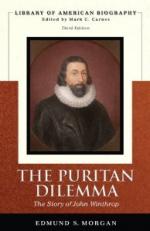
|
| Name: _________________________ | Period: ___________________ |
This test consists of 5 multiple choice questions, 5 short answer questions, and 10 short essay questions.
Multiple Choice Questions
1. When Roger Williams was first offered a position as minister at the Salem church, John Winthrop wrote to whom, marveling that they would choose a teacher with such dangerous views?
(a) Sir Richard Saltonstall
(b) Reverend John Wheelwright
(c) Roger Ludlow
(d) John Endecott
2. Which of John Winthrop’s sons settled in Ipswich?
(a) Paul Winthrop
(b) William Winthrop
(c) John Winthrop, Jr
(d) Henry Winthrop
3. Who is described in Chapter 9: “Separation Unleashed” as the “judicious governor of the colony” at Plymouth that found Roger Williams to be godly and zealous?
(a) John Haynes
(b) Roger Ludlow
(c) William Bradford
(d) John Wilson
4. After Winthrop moved the colony headquarters to Charlestown, he summoned the assistants for their first meeting on what date?
(a) October 19, 1630
(b) May 15, 1629
(c) February 2, 1626
(d) August 23, 1630
5. In 1629, Roger Williams was chaplain to whom in Essex?
(a) Charles de Menon, Sieur d'Aulnay de Charnise
(b) Sir William Masham of High Laver
(c) Reverend John Preston
(d) King James I
Short Answer Questions
1. Where was Anne Hutchinson born?
2. What was Cambridge, Massachusetts called during the first winter when the colonists decided to build their houses there in 1630?
3. Who is quoted in Chapter 11: “The New England Way” as having said “if the people be governors, who shall be governed?”
4. When did the General Court of the Massachusetts Bay Colony finally order Roger Williams to leave the colony within six weeks?
5. What pastor in Watertown and Winthrop's neighbor back in England caused problems by teaching that the Roman Catholic Church was a legitimate body of Christians?
Short Essay Questions
1. When was the “Body of Liberties” adopted in Massachusetts? What did this document contain?
2. What led up to the banishment of Reverend Wheelwright, according to the author in Chapter 10: “Seventeenth-Century Nihilism”?
3. What problems arose in the Massachusetts colony as a result of the outbreak of the English Civil War?
4. Why did John Winthrop’s choice regarding the English Civil War prove to be advantageous to the Puritans, as discussed by the author in Chapter 12: “New England or Old”?
5. How does the author describe Anne Hutchinson’s Antinomian beliefs in Chapter 10: “Seventeenth-Century Nihilism”?
6. When did Anne and William Hutchinson arrive in New England? How does the author describe them in Chapter 10: “Seventeenth-Century Nihilism”?
7. What power did the clergy have in the Massachusetts settlement, according to the author in Chapter 11: “The New England Way”?
8. What forced John Winthrop to reveal the stipulations of the charter to the colonists, according to the author in Chapter 8: “Leniency Rebuked”?
9. What was innovative and potentially controversial about the system of government established by Winthrop and his associates, according to the author in Chapter 7: “A Due Form of Government”?
10. What decision did John Winthrop make regarding the English Civil War? Why?
|
This section contains 910 words (approx. 4 pages at 300 words per page) |

|




